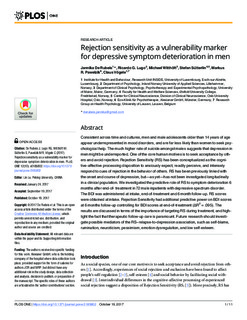Rejection sensitivity as a vulnerability marker for depressive symptom deterioration in men
De Rubeis, Jannika; Lugo, Ricardo; Witthöft, Michael; Sütterlin, Stefan; Pawelzik, Markus R.; Vögele, Claus
Journal article, Peer reviewed
Published version
Permanent lenke
http://hdl.handle.net/11250/2476220Utgivelsesdato
2017Metadata
Vis full innførselSamlinger
Sammendrag
Consistent across time and cultures, men and male adolescents older than 14 years of age
appear underrepresented in mood disorders, and are far less likely than women to seek psychological
help. The much higher rate of suicide amongst males suggests that depression in
men might be underreported. One of the core human motives is to seek acceptance by others
and avoid rejection. Rejection Sensitivity (RS) has been conceptualized as the cognitive-
affective processing disposition to anxiously expect, readily perceive, and intensely
respond to cues of rejection in the behavior of others. RS has been previously linked with
the onset and course of depression, butÐas yetÐhas not been investigated longitudinally
in a clinical population. We investigated the predictive role of RS to symptom deterioration 6
months after end-of- treatment in 72 male inpatients with depressive spectrum disorder.
The BDI was administered at intake, end-of-treatment and 6 month follow-up. RS scores
were obtained at intake. Rejection Sensitivity had additional predictive power on BDI scores
at 6 months follow-up controlling for BDI scores at end-of-treatment (ΔR2 = .095). The
results are discussed in terms of the importance of targeting RS during treatment, and highlight
the fact that therapeutic follow-up care is paramount. Future research should investigate
possible mediators of the RS±relapse-to-depression association, such as self-blame,
rumination, neuroticism, pessimism, emotion dysregulation, and low self-esteem.
